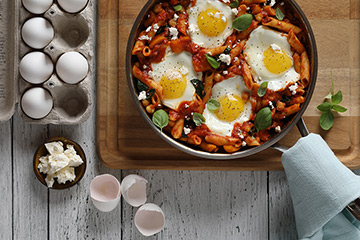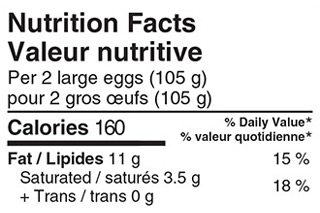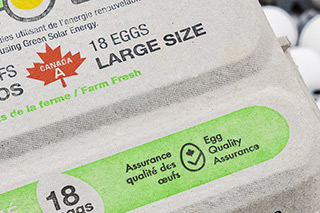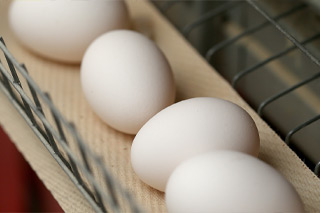Frequently Asked Questions
Food Handling
Is it okay to eat raw or lightly cooked eggs?
When properly handled, lightly cooked Canada Grade ‘A’ eggs are not a concern for healthy individuals. There is a high-risk segment of the population that should avoid eating raw eggs or eggs that are not thoroughly cooked. This includes: people who are suffering from a disease or whose immune system is compromised, very young children, the elderly and pregnant women.
While regulated farmers, graders and retailers work to implement safe handling standards at all levels, consumers also have an important role to play to ensure proper handling practices are followed:
- Purchase only Grade ‘A’ eggs with clean, uncracked shells that have been stored under refrigeration.
- When buying eggs, check the ‘Best Before’ date (found either on the carton or stamped on the eggs). This ‘Best Before’ date represents the length of time the eggs will maintain their Grade ‘A’ quality (which includes small air cell, firm yolk, thick white, clean, uncracked shells). If eggs are going to be used after that date, they should be thoroughly cooked.
- For optimal freshness, store eggs in their original carton on the middle shelf in the refrigerator (ideally at 4°C).
- Wash hands with warm, soapy water before and after food preparation.
- Serve eggs and egg-rich foods immediately after cooking or refrigerate and serve within three to four days.
- When preparing recipes using raw eggs that will not be heated or cooked before they are eaten, reach for pasteurized egg products. For example, you may want to use pasteurized eggs to make Caesar salad dressing and cocktails made with egg (such as ‘whiskey sour or eggnog’).
Pasteurized eggs are sold in whole egg or egg white cartons. Pasteurization means the egg has been heated to a specific temperature for a specific time. This process kills all bacteria in a raw food product. According to Health Canada, egg white must reach a minimum of 54°C (130°F) for 3.5 minutes. Whole eggs must reach a minimum of 60°C (140°F) for 3.5 minutes.
To learn more about egg pasteurization, click here.
For more food handling information, click here.
Can eggs be eaten after the Best Before date?
If they have been kept refrigerated, eggs can be eaten for a short time after the Best Before date. Keep in mind however, the Best Before date (which is stamped on the side of the carton) indicates the length of time the eggs will maintain their Grade A quality. A Grade A egg has a firm yolk, thick white, small air cell at the large end of the egg, and no visible cracks in the shell. For optimum quality and functional performance, eggs should be consumed prior to the Best Before Date.
Can I keep eggs at room temperature?
Eggs are a perishable food and should be stored in their carton in the refrigerator. For optimum quality, eggs should be used up within the “Best Before” date. For every hour eggs are kept at room temperature, they age an entire day.
Can eggs be used after they've been accidentally frozen?
Accidental freezing of eggs, especially in the winter is a common problem. If the eggs have broken through their shells they should be discarded. If the shells are still intact, the eggs can be thawed in the refrigerator and used in a thoroughly cooked dish such as scrambled eggs or hard-cooked eggs. Other uses are limited because once frozen the consistency of the egg yolk changes from a liquid to a solid (much like a hard rubber ball), and becomes lumpy.
How to Freeze Eggs: Raw egg may be frozen at -18ºC (0ºF) for up to four months. Egg whites can be frozen as is, in an air-tight container, leaving room for expansion. To freeze yolks or whole eggs, break them into a bowl, mixing gently without incorporating air to prevent lumpiness in the yolk, add salt, sugar or corn syrup (depending on the intended use) in the following amounts:
½ tsp. (2 mL) salt for every 1 cup (250 mL) egg
1 tbsp. (15 mL) sugar or corn syrup for every 1 cup (250 mL) egg
Place in freezer container, leaving room for expansion. Freeze eggs in small quantities so that only what is needed can be thawed. For easy storage, freeze eggs in an ice cube tray, then transfer to a plastic bag. Frozen eggs should be thawed in the refrigerator and used only in recipe dishes which are thoroughly cooked.
Hard-cooked eggs do not freeze successfully, as cooked egg whites will become tough and rubbery.

 Affordable Meals
Affordable Meals New Recipes
New Recipes Powered by Eggs
Powered by Eggs Ho Ho Holidays!
Ho Ho Holidays! Recipe Booklets
Recipe Booklets Egg Nutrition
Egg Nutrition Care & Quality
Care & Quality Types of Eggs
Types of Eggs